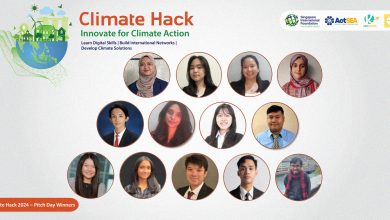MANILA, PHILIPPINES — On Earth Day (April 22), the Heinrich Böll Foundation, the Break Free From Plastic movement, and Institute for Global Environmental Strategies (IGES) published the Asia English edition of the Plastic Atlas. The special edition of Plastic Atlas highlights the large and rapidly growing role of Asian economies as plastic producers, consumers, contributors to the plastic refuse deluge, and dumping ground for the world’s plastic waste. The publication also focuses on particular challenges facing the region, along with potential solutions.
Currently, over half of the plastic produced globally originated from Asia. The region has also become a major destination of plastic waste trade, where South and Southeast Asia emerge to become hotspots. The Plastic Atlas Asia edition highlights Asia’s growing role and impact on plastic production, consumption, and disposal since the post-war period.
With overconsumption exacerbated by the COVID -19 pandemic, the Atlas also highlights the surge of single-use plastics more recently and how the oil and gas industry plans to ramp up production in the coming years. Further, the publication also explains that recycling is not the solution to the plastic crisis, an idea that has been widely promoted by governments and corporations.
Clemens Kunze, Deputy Director of the Heinrich Böll Foundation Hong Kong office and Executive Editor of the Plastic Atlas Asia Edition, said: “Since 99% of all plastics are made of fossil fuels and produce enormous amounts of greenhouse gas emissions along the entire lifecycle of plastic, it is clear that the solutions to the plastic and climate crisis need to go hand in hand. The petrochemical industry is planning a massive expansion of the plastic production infrastructure to flood the global market with yet more waste and toxics. Through the Plastic Atlas, we hope to show our collective responsibilities as people of this region and call on governments and corporations to proactively find ways to lead us out of this crisis.”
Satyarupa Shekhar, Break Free From Plastic Asia Pacific Coordinator, stated: “Asia plays a significant role in the plastic pollution crisis. This joint publication is envisioned to show the root causes of the problem in the region and tackle the deluge of plastic waste due to the COVID-19 pandemic, debunk the myth behind recycling as a panacea, and present the case for transforming communities to become zero waste as the ecological solution to the plastic pollution crisis.”
There are already communities across Asia adopting zero waste practices as a way to reduce and minimise plastic waste produced. The atlas looks at the potential of bottom-up efforts in resolving the plastic crisis. The upscaling requires further efforts from national governments and other stakeholders.
A launch event for a photo exhibition “Journey to the Waste” was also held today (April 22) at FabCafe HK (G/F., 10 New Street, Sheung Wan). The exhibit showcases winning entries from our recent photo contest, and is organized to raise awareness of plastic pollution in Asia ahead of our new Plastic Atlas publication.
A media briefing was organized today (April 22) that serves as a deep dive conversation on the current impacts of the ongoing COVID-19 pandemic in the hardfought gains made on single-use plastics.
The Plastic Atlas Asia edition contains 45 detailed infographics covering a broad range of topics regarding the plastic pollution crisis looking along the entire value chain of plastic. It is a unique contribution to the cause, as these will help people grasp the impacts through the use of data-rich infographics focusing on the region.










